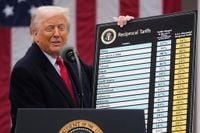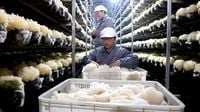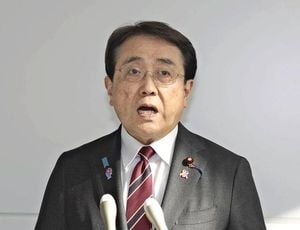The escalating trade war between the United States and China has taken a new turn as President Donald Trump announced the imposition of levies on Chinese ships docking at U.S. ports. This move, which intensifies existing tensions, comes amidst ongoing negotiations aimed at resolving trade disputes between the two economic giants.
On April 17, 2025, Trump expressed optimism about the trade negotiations, stating, "we are going to make a very good deal with China." However, he also indicated a reluctance to continue raising tariffs, suggesting he may prefer lower tariffs to safeguard consumer spending. This sentiment reflects a broader concern about the economic implications of tariffs on both sides.
Despite Trump's hopeful remarks, the reality of the situation is stark. China has raised its tariffs on U.S. goods from 84% to 125%, while U.S. tariffs on Chinese imports have surged, reaching rates as high as 245% on certain products. The White House has clarified that these tariffs include a 125% reciprocal tariff, a 20% tariff to address the fentanyl crisis, and Section 301 tariffs on specific goods ranging from 7.5% to 100%.
U.S. Treasury Secretary Scott Bessent has voiced cautious optimism regarding the clarity of tariffs and progress on key trade deals. He noted, "We are working on the big 15 economies," highlighting ongoing discussions with Japan, the EU, South Korea, and India. However, the baseline 10% tariff that went into effect on April 5 remains in place for all affected imports into the U.S.
As the trade war continues to unfold, various sectors are feeling the impact. Flexport CEO Ryan Petersen warned that many small businesses could face bankruptcy if the current tariff policies remain unchanged, citing a staggering loss of around $1 trillion in economic activity. The repercussions of these tariffs are not limited to the U.S.; they are also felt globally, particularly in countries like Vietnam, where 30% of the economy depends on exports to the United States.
Vietnam's Prime Minister, Pham Minh Chinh, has emphasized his country’s unique bond with the U.S. as it engages in trade talks to avoid significant tariffs on its products. Meanwhile, Japan's Finance Minister Katsunobu Kato has expressed concerns about the potential global economic fallout from U.S. trade policies.
In the automotive sector, major players are reevaluating their production strategies. Toyota is considering producing the next version of its top-selling RAV4 SUV in the United States, while Nissan plans to reduce production of its popular Rogue SUV in Japan. Similarly, Honda is contemplating shifting some car production from Mexico and Canada to the U.S., aiming for 90% of vehicles sold in the country to be manufactured locally.
The repercussions of U.S. tariffs are also being felt in the luxury market. French brand Hermes announced that it would pass the full impact of tariffs onto its affluent U.S. customers, following a first-quarter sales report that fell short of expectations. This decision highlights how tariffs can trickle down to consumers, affecting pricing across various sectors.
Moreover, Hong Kong's postal service has suspended shipments to and from the U.S. in retaliation for Trump's elimination of the "de minimis exception," which previously allowed goods valued at $800 or less to be shipped without tariffs. This move, effective April 27, significantly impacts businesses and individuals relying on postal services, forcing them to use private couriers, which could increase costs.
As the global economy grapples with the fallout from these tariffs, the stock market reflects growing anxieties. Following Trump's announcement of the "Liberation Day" tariffs on April 2, over $6 trillion in stock value was wiped out in just two days. The S&P 500 dropped about 2.4%, the Dow Jones Industrial Average fell over 600 points, and the tech-heavy Nasdaq Composite declined by 3.6%. These developments indicate that investor confidence is shaken amid ongoing trade uncertainties.
While some U.S. companies, such as Johnson & Johnson, expect significant tariff-related costs—estimated at around $400 million this year—others are attempting to shield consumers from price increases. Hyundai's COO, Claudia Marquez, stated that they would implement their Hyundai Assurance Program to ensure that prices would not rise in the immediate future.
As the trade war escalates, the future of U.S.-China relations remains uncertain. China has shown openness to negotiations but has laid out specific conditions, including a need for the U.S. to address disparaging remarks from its officials and to appoint a dedicated negotiator to facilitate discussions. The stakes are high, with the potential for further escalation looming if both sides cannot find common ground.
In light of these developments, the global economic landscape is shifting. Countries that have historically relied on trade with the U.S. are now exploring alternatives. The potential for a realignment of global trade relationships is significant, and the long-term consequences of Trump's tariff policies could reshape international commerce.
As the world watches closely, the question remains: will President Trump seize the opportunity to negotiate a favorable deal, or will the trade war continue to escalate, further straining relations with key allies and partners?





